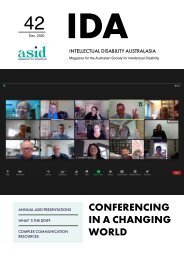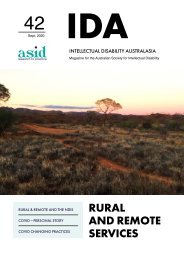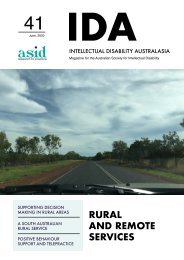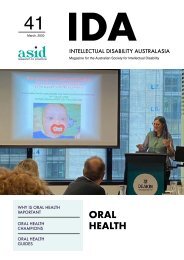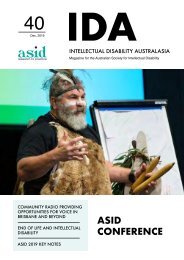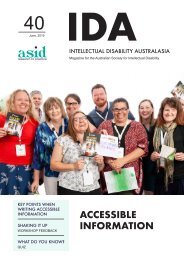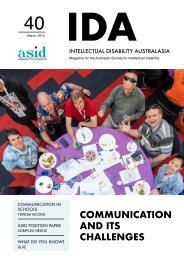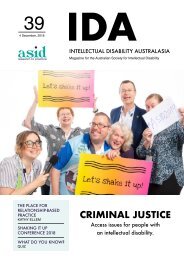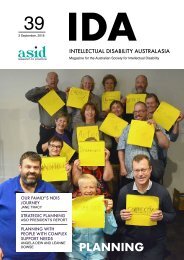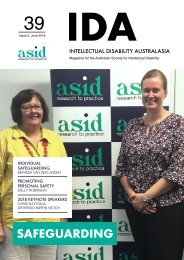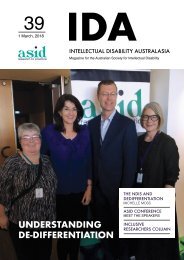IDA Magazine Vol 40 Iss 3 (Sep 2019)
- No tags were found...
You also want an ePaper? Increase the reach of your titles
YUMPU automatically turns print PDFs into web optimized ePapers that Google loves.
ASID <strong>2019</strong> KEYNOTE SPEAKERS<br />
PERSONAL INSIGHT: INTELLECTUAL<br />
DISABILITY RESEARCH CONTRIBUTION<br />
Stacy Clifford Simplician<br />
Stacy addressed the following questions to provide a personal insight into her research contribution<br />
in the area of intellectual disability.<br />
What led you to work in this area?<br />
In 2006, I began pursuing a Master’s degree in political science with a specialization in political<br />
philosophy. I discovered that prominent political philosophers had, at times, excluded people with<br />
intellectual and developmental disabilities from their definitions of personhood and citizenship. As a<br />
sibling of an autistic person, I found this exclusion problematic; I also believed that these theoretical<br />
exclusions impacted policies and practices in the world around me. Hence, if we wanted to change<br />
policies and practices, we also needed to change the ways we think theoretically. That premise guides<br />
my work.<br />
What have been your highlights?<br />
One of the biggest highlights for me has been to work and dialogue with researchers who conduct<br />
empirical work on the social inclusion of people with intellectual and developmental disabilities, and<br />
with professionals in the field of supports and services for people with intellectual and developmental<br />
disabilities. As a political theorist who works primarily with abstract concepts and texts, it has been<br />
gratifying to know that my work has resonated with people in different academic disciplines, particularly<br />
those who work more in applied fields.<br />
How has your work changed practice and what needs to change?<br />
I hope that my work helps support two kinds of changes. First, I hope my work makes visible the lives<br />
of people with intellectual disabilities, their families, and support staff to disciplines not focused on<br />
intellectual disability, including my home disciplines of political science and women’s and gender studies.<br />
To make widespread change, I think more people need to be invested in the quality of life of people with<br />
intellectual and developmental disabilities. The second aim of my work has been to invite people within<br />
the field of intellectual and developmental disabilities to think more theoretically: to consider how feminist<br />
and political theory offers the field of intellectual disability a rich theoretical history that complicates and<br />
expands how we define key concepts. For me, thinking conceptually opens up our imaginations, inviting<br />
us to think about the world in new and inspiring ways.<br />
22 www.asid.asn.au




